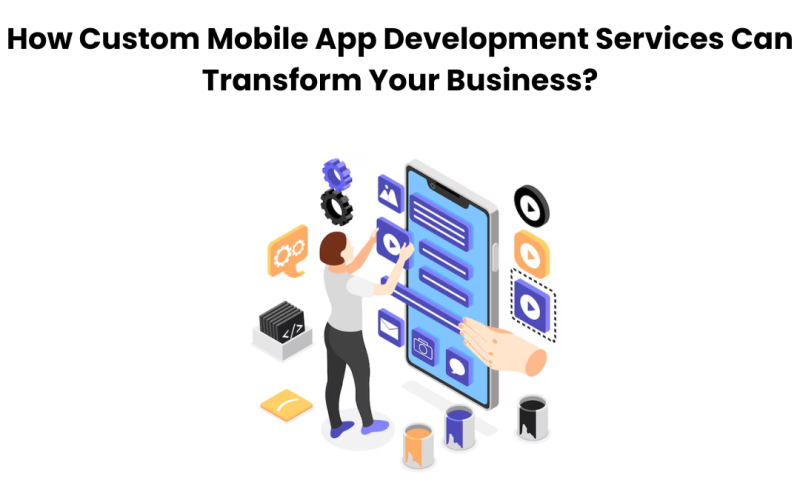In today’s highly competitive digital world, businesses are constantly looking for ways to stand out, deliver better customer experiences, and streamline operations. One of the most powerful tools that have emerged to help businesses do this is custom mobile app development. Unlike off-the-shelf solutions, custom mobile apps are tailored specifically to a company’s unique needs, goals, and customer base.
With the rapid rise of smartphone usage and the growing dependency on mobile apps, businesses can no longer ignore the importance of having a presence on mobile platforms. Whether it’s a startup, mid-sized company, or an established enterprise, custom mobile app development services can bring major transformations across different areas of a business. From boosting efficiency and improving customer loyalty to generating new revenue streams and gaining a competitive edge, the impact is huge.
This blog will explore how custom mobile app development services can revolutionize your business operations, enhance user engagement, and ultimately lead to long-term growth and success.
What Is Custom Mobile App Development?
Custom mobile app development refers to the process of designing and building a mobile application specifically tailored to the unique needs of a business. It’s not a one-size-fits-all approach. Instead, it involves understanding the business goals, target audience, workflows, and challenges to create an app that delivers real value.
These apps are built from the ground up with custom features, personalized user interfaces, and integrated solutions that match the company’s processes. Unlike generic apps, custom apps are more flexible, scalable, and aligned with business strategies.
Why Businesses Need Custom Mobile App Development Services
Tailored to Your Business Goals
One of the main advantages of custom mobile apps is that they are designed with your business in mind. Whether you need an app for managing inventory, booking appointments, handling payments, or engaging with customers, a custom solution ensures that every feature supports your goals.
Generic apps often include unnecessary features or lack the specific tools you need. With a custom app, you control the design, features, and functionality—making it easier to meet both business and user expectations.
Better User Experience
User experience (UX) plays a crucial role in the success of any app. Custom mobile app development allows you to create interfaces that are simple, intuitive, and aligned with your brand identity. This makes it easier for users to navigate the app, complete actions, and stay engaged.
When users enjoy using your app, they are more likely to return, leave positive reviews, and recommend it to others. A well-designed user experience builds trust and improves customer satisfaction.
Improved Operational Efficiency
Custom apps can automate routine tasks, reduce manual work, and improve internal communication. For example, a custom app for your sales team can help track leads, manage follow-ups, and generate reports—all from their mobile devices. This saves time, reduces errors, and boosts productivity.
Custom development also allows for integration with your existing systems like CRM, ERP, or payment gateways. Everything works together smoothly, which leads to faster processes and better data management.
Enhanced Security
When it comes to business apps, security is non-negotiable. Custom apps are built with specific security features tailored to your data and business operations. Unlike general apps, which often follow standard security protocols, a custom app can include extra layers of protection such as encryption, authentication, and secure data storage.
Custom development gives you full control over how sensitive information is handled, ensuring compliance with industry standards and regulations.
Scalability for Future Growth
As your business grows, so do your requirements. A custom mobile app is designed with scalability in mind, allowing you to add new features, expand services, and support more users without starting from scratch. This flexibility ensures that the app evolves with your business.
Generic apps may limit your growth or require expensive upgrades. Custom solutions, on the other hand, offer better long-term value and adaptability.
Key Areas Where Custom Apps Make a Difference
Customer Engagement
Mobile apps allow businesses to connect directly with customers anytime, anywhere. With features like push notifications, personalized offers, chat support, and user profiles, custom apps help businesses stay relevant and responsive.
For example, a custom eCommerce app can send personalized product recommendations, order updates, and exclusive discounts to keep customers engaged and loyal.
Sales and Revenue Generation
Apps can act as a new sales channel. With in-app purchases, subscription models, or mobile bookings, businesses can generate revenue around the clock. A custom app also allows you to track customer behavior, analyze sales data, and optimize your offerings.
When the app experience is smooth and reliable, users are more likely to complete purchases and become repeat customers.
Internal Communication and Collaboration
Custom apps are not only for customers. They can also support internal teams by improving communication and collaboration. For example, you can create apps for employee training, shift scheduling, project tracking, or team messaging.
These tools keep your workforce connected and organized, even when working remotely or across different locations.
Brand Recognition
A custom mobile app is a direct reflection of your brand. From the app icon to the interface colors and language, every element can be designed to strengthen your brand identity. This creates a consistent experience across all platforms and leaves a lasting impression on users.
Unlike a generic app, a custom-built one shows professionalism, care, and uniqueness—qualities that customers appreciate.
The Development Process of a Custom Mobile App
Strategy and Planning
This is the first and most important phase. Developers work closely with you to understand your business model, target users, and core needs. Together, you define goals, features, timelines, and budgets.
UI/UX Design
Designers create wireframes and mockups to visualize how the app will look and function. The goal is to create an engaging and intuitive experience for users while staying true to your brand style.
Development and Testing
Developers write the code and build the app’s frontend and backend. During this phase, regular testing is done to ensure the app works as expected, has no bugs, and performs well on different devices.
Launch and Deployment
Once everything is tested and approved, the app is submitted to app stores like Google Play and Apple’s App Store. A successful launch includes preparing app descriptions, screenshots, and marketing materials.
Maintenance and Updates
After launch, the work continues. Developers provide ongoing support to fix bugs, add new features, and update the app according to user feedback and business changes.
Choosing the Right App Development Partner
To get the most out of your custom mobile app, you need a skilled and reliable app development company. Look for a team with experience in your industry, a solid portfolio, and positive client feedback. Good communication, transparency, and support are also key factors when choosing a development partner.
An experienced app development company will guide you through every step of the process, from idea to launch and beyond. They will also help you stay on top of technology trends and user expectations.
Real-World Examples of Custom Apps in Action
Many successful businesses have used custom mobile apps to transform their operations. For example, a logistics company might use a custom app to track shipments and optimize delivery routes. A fitness brand can offer personalized workout plans and progress tracking. A restaurant chain can allow online ordering, reservations, and loyalty points—all through their app.
These apps not only improve efficiency but also create unique experiences that customers appreciate and remember.
The Long-Term Value of Custom Mobile Apps
Custom apps are not just a short-term solution. They are a long-term investment that can offer continuous returns. As user needs change, your app can evolve. You can add features based on feedback, enter new markets, and adapt to industry trends.
Unlike ready-made solutions, which may become outdated or unsupported, custom apps give you full ownership and control. This makes them a more secure and flexible option for growing businesses.
Conclusion
Custom mobile app development services offer businesses a powerful way to grow, connect with customers, and improve internal processes. With personalized features, better performance, and full control, custom apps go far beyond what off-the-shelf solutions can provide. They help businesses stand out in the market, build strong brand loyalty, and generate higher revenue over time.
Whether you’re a small startup or a large company, the value of a tailored mobile app is undeniable. To truly make the most of mobile technology and stay ahead of the competition, partnering with a trusted app development company is the right move. They bring the experience, creativity, and technical skills to turn your vision into a high-performing, user-friendly app that transforms your business from the inside out.
FAQs
What is the difference between a custom mobile app and a generic app?
A custom mobile app is built specifically for a business’s unique needs, with tailored features and design, while a generic app is a one-size-fits-all solution that may not meet specific business requirements.
How long does it take to develop a custom mobile app?
The timeline can vary based on the complexity and features of the app, but most custom apps take between 3 to 6 months from planning to launch.
Can I update and add features to my custom app after it is launched?
Yes, one of the biggest advantages of custom apps is that they are scalable and can be updated regularly with new features based on user feedback and business needs.
Do I need a mobile app if I already have a website?
While a website is important, a mobile app offers better performance, offline access, personalization, and direct communication, making it a valuable addition to your digital presence.
How do I choose the right app development company?
Look for a company with relevant experience, positive client reviews, a strong portfolio, and good communication practices to ensure your app is developed effectively.












